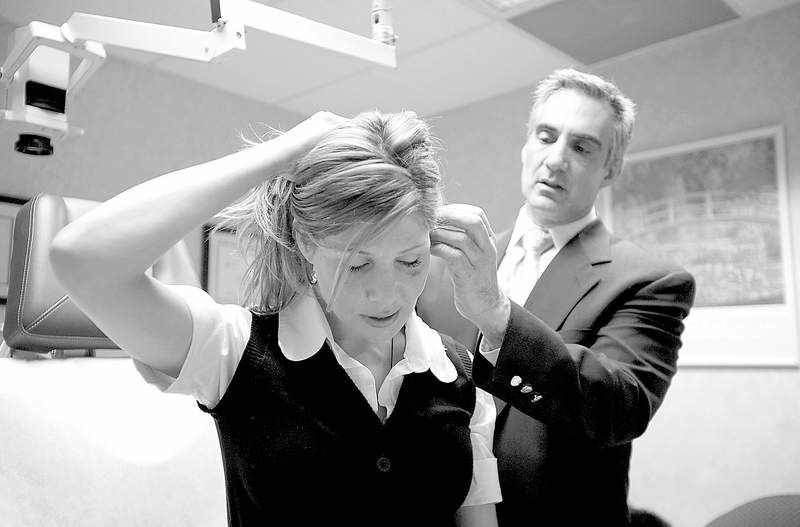Patients seen delaying surgery, or rushing it
Published 5:00 am Saturday, March 14, 2009

- Val Arnold, 37, skin cancer survivor, is examined by Dr. Kenneth Shaheen at his office in Troy, Mich. Arnold said she chose to have reconstructive surgery on her nose on Feb. 13 because she had been laid off from her job with General Motors and would lose her employer-sponsored insurance on March 1.
As the recession deepens, doctors and hospitals are reporting that cash-strapped patients are deferring elective surgeries, like knee replacements and nose jobs, even as others are speeding up non-urgent procedures out of fear that they may soon lose their jobs and health insurance.
With unemployment still rising, there are wide variations by region and type of surgery. That means that highly regarded orthopedic surgeons in Chicago may be as busy as ever, while gastroenterologists in Atlanta are scrambling to replace cancellations.
But even those whose operating rooms are booked months in advance say they anticipate a slowdown later this year.
Delaying elective procedures can have serious medical consequences, as when a detectable polyp develops into a tumor because a patient skips a colonoscopy. Some hospitals said their emergency rooms were already seeing patients with dire conditions that could have been avoided had they not deferred surgeries for economic reasons.
“We’re probably seeing five or six of those a day at each of our hospitals,” said Zeff Ross, a senior vice president at Memorial Healthcare System, which operates six hospitals in South Florida. “Someone gets an attack of diverticulitis, but they wait. They get it a second time and the doctor tells them to get the surgery done now, but they still wait. The third time, it perforates and that’s a much tougher surgery, much more dangerous for the patient and with a longer length of stay.”
The slowdown is likely to have significant financial repercussions. Elective surgeries are typically covered by private insurance plans that tend to reimburse hospitals and doctors at higher rates than government insurance programs like Medicare and Medicaid. As those payments dwindle, so do hospital profit margins and the resources to provide charity care to a growing number of uninsured.
Other factors
“Elective admissions could represent only 9 or 10 percent of a hospital’s admissions and yet represent 25 percent of its bottom line,” said Michael Sachs, chief executive of Sg2, a health care consulting firm. “They’re the patients that subsidize the underfunding associated with Medicaid and Medicare patients and uncompensated care.”
The loss of revenue and growth in uncompensated care is conspiring with other byproducts of the recession — declining philanthropy, battered investments and tight credit — to force many hospitals to lay off workers, postpone expansions and cancel equipment purchases.
A study released in November by the American Hospital Association found that about one-third of hospitals had seen either a moderate or significant decrease in elective procedures in the previous three months. More recent studies in states like New Jersey and Georgia have put the figure closer to 50 percent. Ambulatory surgical centers, which had experienced exponential growth over the last decade, are also reporting a slowdown in some markets.
Dr. David George, an Ohio ophthalmologist who with two other physicians owns an outpatient eye center, said they performed 5 percent fewer cataract surgeries in 2008 than in 2007, after nearly a decade of consistent 10 percent annual growth.
“That was the first down year we’ve had,” George said. “When we tell patients about the benefits of cataract surgery, we’re getting more answers like, ‘Well, it’s not that bad yet. Let’s check it out in six months or a year.’ Even those with good insurance are very concerned about the co-pay and the out-of-pocket costs.”
The trends are far from universal, with some physicians and hospitals saying they have seen little change. Several doctors interviewed reported that some of their patients were deferring procedures while others were accelerating them.
“They’re trying to get things done next week because they know they’re going to be losing their insurance or going to COBRA,” said Dr. Jeffrie Kamean, an Atlanta gastroenterologist.
Kamean was referring to the federal law that allows laid-off workers to continue their employer-sponsored insurance, though at costs that are often prohibitive (the federal stimulus package provides money to subsidize COBRA expenses).
Val Arnold, 37, a skin cancer survivor who lives in Holly, Mich., said she chose to have reconstructive surgery on her nose on Feb. 13 because she had been laid off from her job with General Motors and would lose her employer-sponsored insurance on March 1. She would have preferred to wait, so that she would be immediately available if the automaker reactivated her job.
“It was like all of a sudden I have to get it done now,” Arnold said during her two-week recuperation. “What if they call me this week?”






